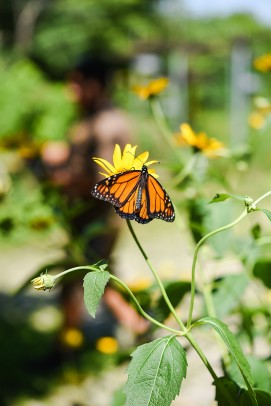UIC receives $1.8M from DOE to study effects of pollinator habitats at solar energy facilities

The University of Illinois Chicago’s Energy Resources Center, or UIC-ERC, was selected to receive a $1.8 million research grant from the U.S. Department of Energy to investigate the impacts of locating pollinator habitat at large-scale solar facilities.
The three-year project, “Evaluation of Economic, Ecological, and Performance Impacts of Co-Located Pollinator Plantings at Large-Scale Solar Installations” will examine the economic, ecological and performance impacts of pollinator habitats co-located at five large-scale solar photovoltaic facilities in the Midwest and Mid-Atlantic regions.
The principal investigator is Iris Caldwell, program manager and senior engineer at the UIC-ERC. Joining Caldwell are Ben Campbell, another senior engineer at the UIC-ERC, along with UIC-ERC supporting team members Steffen Mueller, Indraneel Bhandari and Caroline Hernandez. UIC-ERC has a number of key research partners for the project, including Argonne National Laboratory, the National Renewable Energy Laboratory, Cardno, and several energy companies and solar developers.
The team will develop guidance and decision-making tools for solar-pollinator habitat projects, including a pollinator planting manual, a cost-benefit calculator, a native seed mix selection tool, and a pollinator assessment tool. These tools will address critical stakeholder concerns, including project costs, return on investments, logistical needs and site- or project-specific constraints.
“We are thrilled to embark on this important research with our partners to answer key questions at the intersection of insect pollinator conservation and solar power. We aim to hand decision-makers a suite of tools that will shape the future of large-scale solar development that can provide lasting benefits to pollinators and other wildlife,” Caldwell said.

The Solar Energy Technologies Office, or SETO, announced the selection of the 67 solar technology research projects including UIC’s project. UIC’s Energy Resources Center will receive $1.8 million over a three-year period, beginning in 2021.
“One of the unique and exciting facets of this SETO selection is that it brings together our power generation and sustainable landscape research clusters onto one project,” Campbell said. “The University of Illinois Chicago’s Energy Resources Center team is excited to bring together experience and expertise from a variety of team members and partners to reduce uncertainties in incorporating pollinator plantings at solar facilities while improving the affordability, reliability, and value of solar technologies.”
Through the Office of Energy Efficiency and Renewable Energy’s Solar Energy Technologies Office, the U.S. Department of Energy will fund the research projects across 30 states that reduce the cost of solar, increase U.S. manufacturing competitiveness and improve the reliability of the nation’s electric grid.
“Ensuring low-cost, reliable electricity for all Americans while minimizing risk is a top priority for this department,” U.S. Secretary of Energy Dan Brouillette said in a press release. “That means creating domestic manufacturing opportunities and increasing the power system’s resilience in case of disruptions. Projects that advance solar technologies are essential to achieving these goals.”
Since 1973, the UIC-ERC has provided comprehensive and cutting-edge solutions to a variety of energy and environmental challenges by providing technical assistance, sophisticated modeling capabilities, educational outreach, and program implementation. Since 2001, the UIC-ERC has worked with the DOE Advanced Manufacturing Office promoting Distributed Power Generation.
Since 2017, the UIC-ERC has partnered with more than 45 energy companies and transportation agencies to develop the first nationwide Candidate Conservation Agreement with Assurances, or CCAA, which is a formal agreement between the U.S. Fish and Wildlife Service and non-federal property owners and land managers to engage in important conservation actions to protect the monarch butterfly. In addition, Caldwell is the state coordinator for the Illinois Monarch Project, which collaborates with public and private partners, in addition to individuals across the state, to protect and enhance existing habitat and establish new habitat that supports monarch butterflies and other pollinators.
The U.S. Department of Energy Solar Energy Technologies Office supports early-stage research and development to improve the affordability, reliability, and domestic benefit of solar technologies on the grid. Learn more at energy.gov/solar-office.
